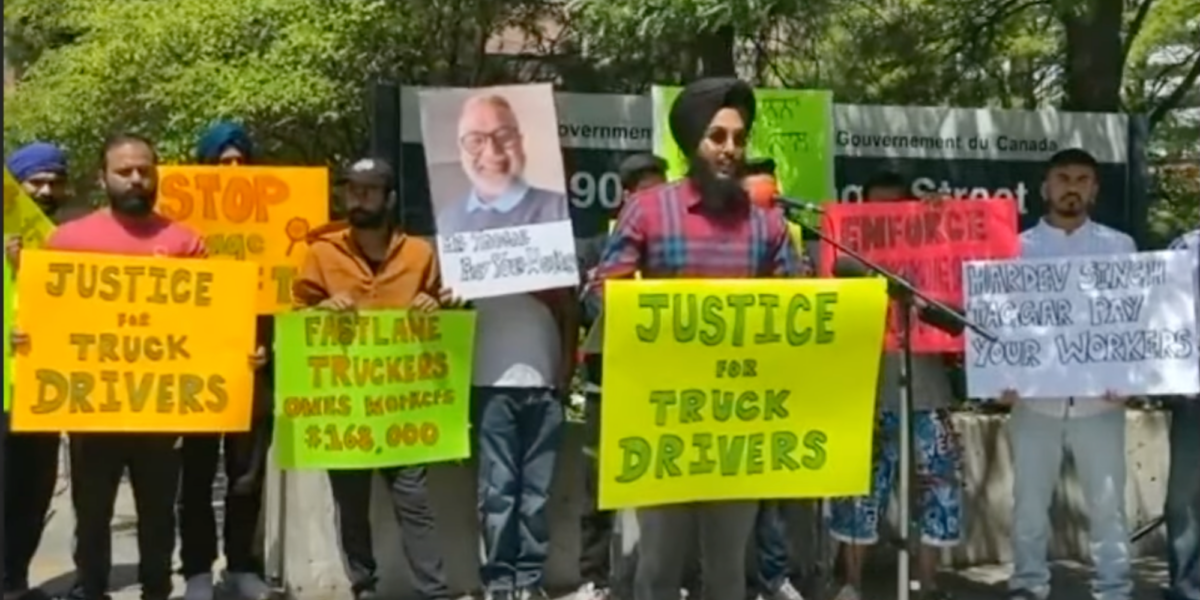The day Manjinder Singh decided to quit his job as a truck driver for JHK Golden Express came upon him suddenly. With no money in his bank account, Singh approached his employer asking to be paid the wages he rightfully deserved.
When his employer continued to make excuses for delayed payments, Singh knew that he could no longer put up with these untenable labour conditions. He quit his job and cried for much of the remainder of the day. Unable to stomach going home, Singh spent the night in his car in a parking lot.
Singh left his job at JHK Golden Express in 2021. To this day, Singh says he is still owed $10,000.
Many truck drivers are facing similar difficulties. According to the community organization Justice for Workers, trucking makes up 17 per cent of federally regulated workers, but 85 per cent of claims for unpaid wages.
“Wage theft is rampant for truck drivers,” Justice for Workers wrote on their website. “…Yet the gaps in the Canada Labour Code and ineffective enforcement leave all too many truckers without their hard-earned wages and leave employers confident they can steal workers’ wages.”
Singh said that while working at JHK Golden Express, he would sometimes go months without being paid.
“I had a job but I couldn’t survive,” Singh said. “How was I to survive? I have my car payments, car insurance. I have rent and grocery bills.”
The amounts employers owe can reach into the hundreds of thousands of dollars. At the moment, Sondh Freight Systems owes $124,000 to 20 workers.
The three main issues plaguing truck drivers
Earlier this year, truck drivers identified the three main issues they face. According to Navi Aujla, Executive Director, Labour Community Services Peel, truckers are losing wages and access to their rights due to misclassification, lack of protection for migrant workers, and lack of enforcement of labour laws.
“If a driver doesn’t own the truck, they should be an employee,” Aujla said, “but most of the truck drivers we’re seeing in our cases have been misclassified.”
Misclassified truck drivers have trouble accessing their labour entitlements under Part III of the Canadian Labour code. This means workers may be denied the hours of work, holidays and minimum wages to which they are entitled.
Aujla said that this misclassification leads to wage deductions for truck drivers whenever there is any damage to the vehicles they use.
“They hold a security deposit of $2,000 when they started working. Then people aren’t paid for 30 to 45 days,” he said. “There’s no overtime vacation pay holiday pay for things because they’re allowed to misclassify them.”
Justice for Workers said the government has found that 60 per cent of truck drivers are misclassified.
Meanwhile, immigration laws still leave many migrant workers tied to a specific employer. So even when working conditions are abysmal, workers fear leaving their job, Aujla said.
“The third piece which is also probably super huge as well, is enforcement from the government,” Aujla said. “A lot of these laws already exist. Misclassification is illegal. A lot of the stuff we’re seeing is already illegal. But when workers file claims, the government takes so long. Even when payment orders are issued, the government doesn’t enforce them.”
For Singh, the lack of enforcement means he is still yet to be paid for work he did before January 2021.
Singh said that his employer was given a payment order with a deadline of 15 days. When those days passed and Singh still didn’t receive any money, a labour officer tried to enforce the payment order but was prevented from speaking with Singh’s employer.
“I’m thinking my money’s already gone,” Singh said.
Working conditions have pushed many people out of the profession, Aujla said. With recent media attention of the “fragile state of the supply chain” while port workers in B.C. were on strike, trucking employers should be held accountable for the damage they do to the supply chain as well.
From driving in the streets to marching in them
“When I first met groups like Justice for workers, I wasn’t willing to propose a protest because I felt like it’s defaming for that person,” Singh said. “I wasn’t gonna do that much. I didn’t want to go up to that point.”
“But now it’s been two years since I filed my case. And I guess I understand how one might have the idea,” Singh continued.
In recent years, Singh has been involved with organizing efforts fighting for better labour conditions for truck drivers. He has spoken at community organized press conferences and meetings to raise awareness about the issue.
“Employees are forced to write to their employer,” Singh said. “We must show employers that they will have consequences, even if they aren’t facing many from the government at this time.”
Singh said that workers are being exploited every day and he is proud to be fighting against that exploitation.
“I’m already an example of what’s going on in the system,” Singh said, “so I could use my example to teach about the system.”



